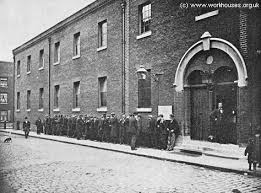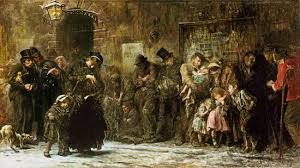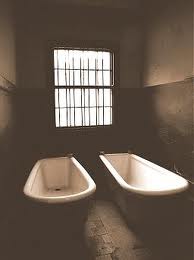HJ Harris (b.1903): Life and Labour
‘A lady tried to sympathise with me in my plight of homelessness, so she sheltered me for a few days. She fussed about a little too fussily, I thought, and I was not used to being cared for’ (Harris 18/06/78)
HJ started life in working class family in Bristol in 1903. His father was a cycle polisher until his mysterious death in 1906, which incidentally is the year HJ went into Muller’s Orphanage.
HJ’s working life began in the orphanage because as well as living there, he also had daily chores to complete. According to David Vincent awareness of self is acquired in the family household so with HJ’s household being the orphanage, this is where his identity was formed. As a very young child HJ wet the bed, probably feeling anxious and fearful, and because of this he was labelled ‘unsociable’ and therefore not worthy of an apprenticeship. I have mentioned in other blogs that I think the labelling from childhood has influenced his life and also has led to low self-worth.
HJ was discharged from the orphanage at aged 14, where he went to live with a friend of his sisters. After leaving his lodgings because of a misunderstanding HJ stayed in Gordon Boys Working Home in Deritend Birmingham for a short time,
‘I was found a job, sorting out old rags and baling up old metal scrap. But I was worked so hard, and being physically weak I found I couldn’t stop as such work. I was classed as ‘work shy’ (Harris 3/5/78).
This labelling as ‘work shy’ is quite a contrast to when HJ is older because he is actually employed in a responsible position and later on becomes a respectable home owner. The fact that HJ is now a home owner and a worker shows that he is one of the ‘productive classes’ and is therefore respectable according to society (Vincent, P62).
As a working class man HJ was not in control of the labour process and therefore was alienated from society as ‘idle’ and ‘undeserving’. To make matters worse, he was also now classed as a ‘tramp’ because he was ‘living on the tramp’ (Harris, 30/01/84). HJ started life as a tramp when he was kicked out of the workhouse for being work shy. He stayed in ‘a doss house with ex jail birds and a real motley cross section of the underworld’ (Harris 03/04/78).
‘And it is with one of these that I started life as a tramp’ he taught me how to snare rabbits and steal eggs from a farm stealthily without disturbing the dogs’ (Harris 03/04/78)
Victorians referred to those who needed short term help as ‘casuals’ or ‘vagabonds’ and rather than claim workhouse relief they would spend a night at a Casual Ward. The Casual Ward system was introduced in 1842 as a way of providing accommodation for vagrants by making them work.
Luke Fildes’s painting Applicants for Admission to a Casual Ward (1874) shows scenes of vagrant men cradling sick children, but in the same scene a policeman is seen hovering in the background. Fildes’s painting shows that there is some sympathy for ‘tramps’ but also shows that there are anxieties about men shirking their responsibilities. At the time the male ideal was to be a breadwinner, but the tramp challenged working and middle class notions of an independent, respectable male.
As well as staying in dosshouses or workhouses, HJ also mentions Casual wards in his memoirs,
‘Sometimes we would stay at Casual wards if we were near a town or wanted a bath’
,
‘I used to suffer fainting fits and black outs and so when my tramping brought me to London I was advised to go to the Maudsley Hospital but I was said to be a paranoid schizophrenic’(Harris, 03/05/78)
HJ mentions his physical health and not being physically fit but mostly he writes about his mental health, and how it has affected him in his life,
‘I was always regarded a bit queer, but they thought harmless’ (Harris, 03/05/78)
‘It seems I then went beserk and that night and I was picked up from my lodgings and found myself in Hollymoor Mental Hospital’(Harris, 03/05/78)
‘This was in the early 30’s and since then I have been in and out of mental hospitals many times. On two occasions as a depressive and attempted suicide’(Harris, 03/05/78)
You can read more about HJ’s experiences in his letters, in particular 03/05/78.
‘Of course lunatic asylums do not exist, Mental Hospitals are quite different. In these places there was some attempt on CURE. But in LAS [lunatic asylums] it was taken that there was no cure and none was attempted, except that bad teeth, tonsils, adenoids and such were removed, but other than that you was given up as incurable’(Harris, 03/05/78)
I have so enjoyed reading about HJ’s life in his memoirs. He has had a troublesome yet full life, and although I empathise with how sad his life was, I also feel proud of him. He seems to be torn between gratitude for his opportunities and experiences and feeling bitter.
‘Forgive me for being such a curmudgeon. I ought to be thanking my former benefactors. At least they acted according to their lights and thought they were protecting me’ (Harris 30/01/84)
It was a hard life for any working class person at this time, but HJ made a good life for himself despite the disadvantages he had. He did not appear to experience love, and indeed found his wife, in an advert in a shop window,
‘A woman would like to meet a gent with a view to friendship…My only thought was to have someone cook and do for me, whereas in return she could have somewhere free to live’ (Harris, 03/05/78)
Rather than being a love affair it appeared to be a business deal, with both parties having their individual needs met.
So it is with extreme fondness that I bid farewell to Mr HJ Harris. I do hope you have enjoyed reading about his trials and tribulations, as much as me. Even though this blog began as a module to be completed for university I am going to continue to research about him and will update the blogs as and when I discover something new or interesting.
I think it is only fitting to give the last word to Mr Harris,
‘I’m 80 now, CURE should come within the next decade, I think. We love in hope but die in despair. Oh dear! I bet you’ll be glad when I shut up rambling like this, But forgive, it’s my condition (Harris, 03/05/78)
Bibliography
Burnett, John ed. Idle Hands: The Experience of Unemployment, 1790-1990 London: Routledge, 1994. {Mr Harris was unemployed since he left the orphanage}
Harris, H.J. Autobiographical letters 197801984, TS, pp.13 (c5,000 words). Brunel University Library
Strange, Julie Marie. ‘New Agenda Tramp: Sentiment and the Homeless Man in the late-Victorian and Edwardian City.’ Journal of Victorian Culture Vol, 16. No. 2, August 2011, 242-258
Vincent, David. Bread, Knowledge and Freedom: A Study of Nineteenth-Century Working-Class Autobiography. London: Methuen, 1981
The Workhouse. The story of an institution. Tramps and Vagrants http://www.workhouses.org.uk/vagrants/index.shtml




Leave a Reply